#meta:toga
Note
More and more in bnha it seems like it's coming down to ochako and by extension toga to actually change anything in hero society. Because none of the other heroes seem to even consider the thought of anything from the villain's perspective or see the need for change.
Mic. Saying kurogiri/shirakumo should disappear as a good memory if he tries to help tomura, despite the fact that mic. Knows something of his old friend is in there because kuro/kumo told them about the hospital.
Shouji saying 'don't let them exploit your wounds' while not committing to protect any more heteromorphs from getting those wounds in the first place other than being cool/a shining light or something.
Deku saying 'I'll bring it all back", truly the exact opposite of what the current society, current world needs. Mind-blowing that deku hasn't realized that by now despite everything he's been through, or rather that he's written that way.
I'm not really sure where shouto's plot line is going honestly, seems like dabi left already.
It's getting down to the wire for even the promise of something better. Do you think ochako and toga will pull through as something more?
Unpopular opinion here but no, I don't think the current Uraraka is any better than the other three, no. I've seen some place faith in her to react differently, but they seem to be forgetting that Ochako said this about Toga not too long ago:


She does acknowledge that Toga is a person, which is a baby step in the right direction, but in the literal same train of thought she then confesses to watching the destroyed landscape to remember Toga by the atrocities she committed first. So that she won't accidentally sympathize too much with a monster. A monster with emotions, but still a monster nonetheless.
I don't read this as any differently from the self-righteousness of the other three because it's the same sentiment. It's dressed up as something slightly nicer, but she also opened said speech with this line:
"Look what they did to the city. She's a villain who helped them snuff out people's lives. Their happiness. The thought of just forgiving her? Nah."
Which is the same accusation the heroes and the kids keep throwing in the villains' faces.
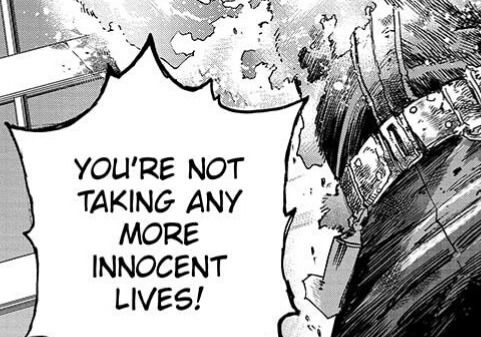
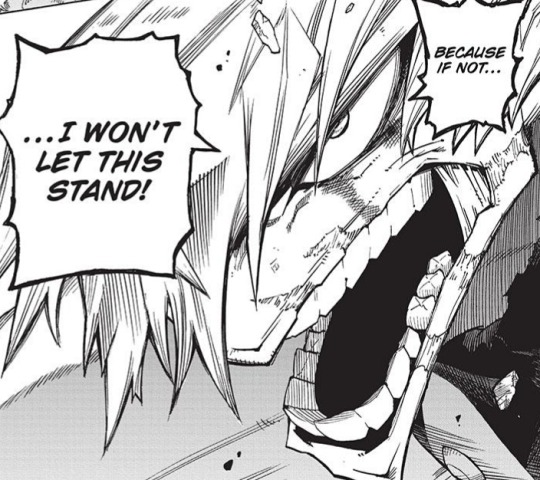
"you took innocent lives and I can't let you keep doing that"
At the end of the day, any attempt at a dialogue always dies down quickly because the heroes approach this from the wrong angle. They're mostly here because they're acting according to their ideals as heroes. According to their moral codes, they can't let people die if they can do something about it. All of them have stated this as a main motivator for their actions at some point or another. I don't remember if Ochako did outright, but it doesn't matter because the same attitude is implied in her words above.
In her eyes, Toga Himiko is sympathetic, but her desire to understand the tears she saw in her eyes isn't enough to override Ochako's heroic drive on its own. The destruction Toga is complicit in is the cold shower of reality that prevents her from really putting herself in Toga's shoes long enough to get a glimpse of her motivations. So she doesn't understand her, and doesn't really try to. Like the other three,
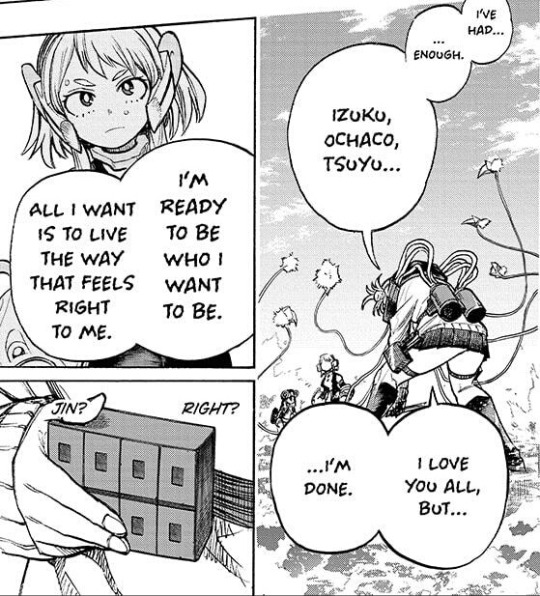
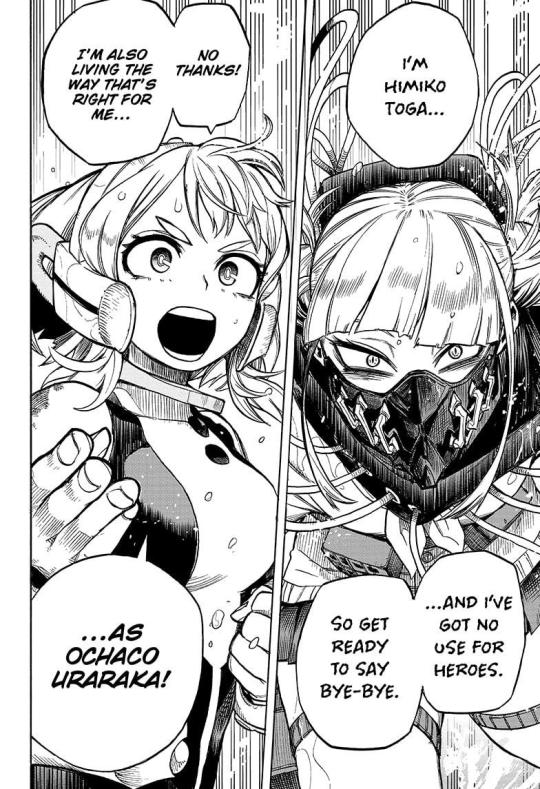
She shuts down the conversation right at the start.
And like the other three, she's probably going to fail too, at least at first, because this approach isn't going to work. It didn't with Dabi and with Spinner, and it won't with Toga, either.
49 notes
·
View notes
Note
Does the current chapter leak confirm, do you think, that toga himiko is also an unreliable narrator or at least doesn't know exactly she wants?
Because while she says that she wants to eliminate all the heroes, she doesn't kill tsuyu when she literally has her in the palm of her hand. It didn't look like a struggle really on toga's part when she had tsuyu, or even aggressive at all.
What do you think?
I think Toga's "I want to kill all heroes" mirrors Dabi's "there are no real heroes" and Shigaraki's "I want to destroy everything". They all have issues that stems from loss and from heroes mishandling their power to protect the status quo instead of saving people like them. So they're lashing out against anything they feel is responsible for things being that way.
So I think it's less like Toga didn't engage with Tsuyu because she has no bone to pick with her and more like she left Tsuyu behind because she's singlemindedly determined to go after Hawks the way Dabi is determined to go after his dad. At last, Toga too found a hero to blame everything wrong with society onto, and that's Hawks for her like it is Endvr for Dabi and All Might for Shigaraki.
I would say that they know exactly what they want, but it's just not what they need. KIlling Hawks won't make Toga happy in much the same way enacting their revenge won't make the other two happy or fulfilled either, because it simply won't give them their old life back. But it's meant to be self-destructive. Toga, like her two foils, isn't working towards changing things, but simply seeking to dismantle what hurt her and her friends.
The thing about Shigaraki and Dabi being unreliable narrators imho is less to be taken as if they don't know what they want, but rather that they do, but they don't yet realize they've been conditioned to want it. It's not a real choice if heroes denied them any other chance to pick anything else.
Now this applies to Toga as well. She tried fitting in, being a normal girl, and was abused and treated like a monster. She tried staying on the outskirts of society, building bonds with people just like her who accepted her, and a hero killed one of them, and society still treated like a monster, and covered her house in abusive graffiti. Since heroes didn't see Twice as a person, and thus Toga by extension, she doesn't want to include them in her version of a happy life anymore. It parallels how Shigaraki rejects a society that always rejected him, ever since childhood, where he was "gently denied" by his own family. Or how Dabi rejects the system for blindly supporting his dad despite how that same person beat up his family for years under everyone's nose.
It's retaliation. They want a blank slate because the current system made them scapegoats, and now they don't want to simply go down in silence anymore, but instead deflect that blame at its true source, at corrupted heroes themselves
40 notes
·
View notes
Note
Excuse me can you write Random facts about Dabi and Himiko? I know you wrote about dabi before but after his the full context of his backstory came out I thought it might be good to expand on the post
Hi! As I have already written a random facts masterpost about him, I don't plan on redoing it / updating it, sorry. I am not interested in bnha anymore so you won't see me writing meta about it in the future. You might have better luck asking bloggers who still talk about the series. This is firmly a blue lock blog now.
That being said, if for whatever reason you still wanted to know my thoughts on Dabi post reveal, then you should probably check out this masterpost. Either that or look up the tags "#meta:dabi" and "meta:toga" (without the quotes) on the search function of this blog. There's years worth of stuff in there. I've said everything I could about the series already, so good luck digging!
#Ali replies#I feel Iike there's still people following me for bnha here despite it being months since I last discussed the series#And several posts about switching fandoms#So if you somehow missed all the above... Please do yourself a favour and unfollow!#I do not wish to bore you if blue lock is not your cup of tea#I'm too burned out with bnha to ever return to writing meta about it#At most I will simply catch up with the manga to know what happened after I left#Without blogging about it#... Sorry
3 notes
·
View notes
Text
on the symbolism of Dabi burning down Toga's house
I haven't seen anyone discuss this yet, so in light of all the misreadings about Dabi's intentions, let's talk about symbolism.
Why the house, specifically? Has anyone tried to wonder about why did Horikoshi bother to show us that scene? What does burning a empty house full of bad memories mean, aside from a cool backdrop for a dramatic one-liner?
Well, you see. Horikoshi isn't actually very subtle. This is the third time in a row he deliberately used a house as symbolism of despotic control, and of finding your true self-expression by getting rid of the chains holding you back.
[under a cut for length]
Exhibit one: Tenko

again, since Horikoshi has the subtlety of a flamethrower, he literally showed the Shimura's house as the background of this very telling line.
Let's recap: Shimura Kotaro was a middle-class man who became wealthy pretty young. Being well-off, he built a home for his family, and invited his in-laws to live with him. As a result, as it's pretty much implied, he became the patriarch of that household. Everyone depended economically on him, and this is likely the reason why Nao, his wife, waited a very long time before starting to oppose the way he ruled said house. Arguably, she waited too long. By the time tragedy struck, Tenko's sense of self had been literally beaten to the point of snapping under pressure.
It is important to note here that despite being the main instigator, Kotaro is not the only adult to blame for Tenko's emotional neglect. The whole household contributed to it in one way or another, as we're explictly told

Nao was a loving mother, but she also refrained from stepping in until the abuse tuned from “just” emotional to physical as well. Tenko's grandparents soothed him with treats instead of defending him in front of his father. Hana broke as many rules as Tenko, but lied to get away with it by blaming her brother instead.
In other words, Tenko grew up without a single shred of validation from any of them. Instead of encouraging him as parents should, they actively tried to dissuade him from pursuing his dreams. And when that failed, they singled him out as the reason why the family wasn't happy. Kotarou tells Tenko to his face that all he wanted was to create a happy family. The implication being, of course, that Tenko was an obstacle to that.
The “peace” of that household rested on the expectation that Tenko should just “quit” his aspiration to become a hero because it didn't make his father happy. All of them let the abuse happen, expecting that Tenko would one day accept to follow his father's rules.
Tenko was (thought to be) quirkless, but he was still denied his individuality. And Shigaraki tells us this. The house he grew up in “gently denied him.” What this means is that he wasn't allowed self-expression. He had to sneak around his father's office, play heroes with his sister in secret, swallow back his protests when he got “punished”, all because the family as a unit functioned on the assumption that everyone should just act in a way that the patriarch found palatable.
The house as this symbol of rejection of your true self comes back again in Shigaraki's dreamscape. Quite tellingly, too. So when he finally frees himself from their shackles (or the choking hands, if you will),

symbolically the house appears once again, but it's now in tatters:

How does this relate to the most recent chapter, you might wonder. I'm getting there.
Exhibit 2. Touya
With Touya, the house symbolism is a lot less prominent, but it's still there. For one it's reflected in the power imbalances of the household. Much like Kotaro, Enji is an authoritative patriarch who built a home with his wealth and influence. He bought a wife, had kids, and showcased his power by buying a huge traditional-style house. It could even be argued that Rei is as dependant on her husband as Nao was to Kotaro, since the Himura family was stated to be poor and in decline.
The parallels don't stop there. In the Todoroki mansion there are no rules, but there's still roles to play, and a looming father's will that reigns absolute. Just like Tenko, Touya gets rejected for his stubborn refusal to “quit" (the training) for his own good and singled out as the reason of the family's unhappiness. This can be seen both in how the family still sees Shouto vs how they see Dabi, but also in their background. For one, instead of easing Touya's abandoment issues, Enji's idea of “fixing” the family after Touya attacked his youngest son was... to isolate Shouto. The implication being that Touya was the problem, not the parenting itself (or lack thereof).
This goes on. Shouto grows, becomes everything his father had always wanted, and Touya becomes more and more invisible in his parent's eyes. Once again, the child's ambition is blamed as the reason that legitimizes the neglect. If Touya could just give up the training. If he would just stop burning himself. If he could make friends like a normal kid and find other hobbies instead of being obsessed with becoming his father's heir.
It's the same routine as above. Instead of addressing the actual cause behind the family's unhappiness, the Todoroki all subconsciously (or not) wish for Touya to simply... deny who he is and move on. For the sake of the rest of the family. It gets so bad that they cannot even look him in the eyes anymore. If Tenko's family “gently denied him,” Touya's straight up didn't acknowledge his existence, until the moment he too snapped under that pressure.
So once again, the household itself becomes a symbol of that rejection. This is exemplified by this panel:

Where we see Dabi symbolically “crying” blood over a panel depicting the Todoroki household, the house that abandoned him, the house that didn't even recognize him when he came back. And he's pleading for them to look at him.
Annnd now we get to exhibit 3. Our girl Toga.
Toga's backstory is much more succint than the other two, so the parallels we can draw are limited. But this chapter shows that they're still very much present.
During her fight against Curious, we see Toga reject the idea that she's a deviant, that she's not the typical definition of a “normal” girl. And in her flashbacks, we learn why. Ever since her quirk manifested, she developed a fascination for blood. But instead of being nurtured with love, her parents rejected her as “monstrous” for it. They verbally abused her and made her go through quirk counseling, seeking to repress the part of herself that craved blood as just another body function.
Quirk prejudice here definitely played a role. This gets a little lost in translation but the original word for quirk, “kosei”, means individuality. The worldbuilding of the series shows us multiple examples of how this rationalization of superpowers has lead to a toxic mindset. To hero society, individuals are their quirk. They stop being seen as human beings and they become containers of powers that are either exploitable or too dangerous. This is why, for example, killing Twice made sense to an utilitarian soldier like Hawks. Twice was his friend, and he liked him as a person, but Twice was also the container of a quirk that was too powerful not to be a threat.
Hero society, and the HPSC in particular, promotes this idea that quirks have value depending on their marketability, on how easily they can be commodified by serving society through a hero license. This is why flashy combat-types are seen as the top of the social pyramid, and why those... let's say “less palatable” quirks like Shinsou's are regarded with distrust and seen as “villainous.” So the former become tools at the HPSC's disposal, and they become heroes applauded by the masses. The rest is labeled as useless at best (Spinner, Deku), and a villain in the making at worst. Since the general assumption is that people are their quirks, and quirks are either good or bad, it follows that people would be categorized as good and bad on a moral scale according to them as well.

So, to bring this back to my original point. Toga's parents obviously gave in to societal pressure. Instead of understanding her power, they got scared of it. They, before anyone else, treated it as something dirty, as something that wouldn't be accepted, and forced Toga to repress it.

her flashbacks show her symbolically wearing a mask. This of course is a visual connection to Tenko and Touya's backstories. Her "normal lufestyle" involved her lying about who she was, until she stopped being depicted with a face altogether. It's pretty straightforward, right there in the art. Her parents expected her to be that. A doll with a plastic smile painted on.



Much like Touya, she became the subject of various "if only" scenarios that were aiming to "fix" her. If only she was less weird. If only she would quit drinking blood. If only she was normal.
All three kids were asked to be someone they weren't for the sake of appeasing their parents. Tenko was told to obey rules. Touya was told to move on with his life. Toga was made to act like a watered-down version of herself. All three of them eventually snapped under pressure. All three of them left the nest in hopes of finding the means to a better self-expression. Tenko thought he found someone who accepted him for who he is in AFO. Touya thought he found a reason to live in the rejection of everything his father is. Toga thought she found a family of strays who let her live how she pleases.
Point is, all of them found a reason to just be in each other's company. Cause all of their respective households were never much of a home to any of them. But this is where it gets interesting. During this arc, the symbolism of the house becomes a larger metaphor. It's no longer just a symbol of parental rejection, but of society's as well.
This chapter does a great job of showing this. Toga's house is destroyed and full of graffiti calling her a monster; this is a reflection of how society still sees her. They don't know the great empathy she's capable of. They don't know about her emotional intelligence. They don't see a teenage girl who's just trying to be, they see a disturbance, a threat to the masses' happiness.
Dabi went on national TV to unveil his father's abuse and call for a bit of sympathy from the population, for them to hold his father accountable for years and years of domestic violence. In turn, they called him annoying, insane, gave his abuser a second chance and are now pushing heroes to just “deal” with him and reassure them that everything will be okay.
In other words, on a much larger scale, those three kids who were scapegoated and villainized by their families are still being scapegoated and villainized for the sake of keeping up a pretense of normalcy. Only now it's by the whole country instead. If they just “quit” being villains, the problem will be solved. Society will still be on the verge of collapsing, heroes will continue to be corrupt and largely in for the fame and money, but society as a whole would be able to return to brushing everything they don't want to see under the rug.
Which, by the way, is exactly what the League is trying to fight. The League of villains, at its core (not counting AFO's influence), is a group of outcasts that was born from the need to destroy the current status quo. This destruction is largely a trauma response. It's not subversive; they're not trying to build something better in its place. They're simply seeking to dismantle a system that never made any breathing space for those like them. It's reactionary. It's anger. It's hurt.
With all of this in mind, I want you to see that Dabi burning Toga's house is an act of solidarity. Where society still doesn't accept her (them), sees her as a threat to stomp on, Dabi offers her companionship and acceptance, in his own Dabi way. He burns down the house that rejected her, the house bearing the angry signs of a crowd that still largely hates them, that blames them for the heroes' failures. Yes, Dabi frames it as seeing Toga as an asset, but he makes her part of her plan to wreck this ruthless, unsympathetic society that never loved them. There's compassion in this act, but you gotta see through the layers of his denial to see it for what it is. This is Dabi acknowledging their common ground. A few chapters back he said “I didn't go far enough” while watching his father's press conference and the lack of consequences he received. Now he's burning down a symbol of their rejection, of society's unwillingness to see them as people.
And that's character development, not manipulation.
Dai went from telling Shigaraki “I don't care about your personal feelings, boss” to asking Toga if she'd made up her mind and encouraging her to smile in the face of ruthless dehumanization. Cause where the masses see a blood-drinking monster, Dabi sees a girl who loves so intensely she can bring back the dead.
343 notes
·
View notes
Note
The ramp-up at the end of the chapter somehow feels.....pretty inconsistent to me? We know Dabi is not planning to live through this, but the point during the last war seemed to be to make Endvr watch the destruction he causes. Even a little before this he says "the tension has dropped" now that Endvr is no longer here. So why is he burning himself out to take out Shouto now?
Mmh, I'll admit that I have very mixed feelings about it.
On the one hand, rather than seeing it as inconsistent, I thought it was rather abrupt and unexpected. It struck me as out of place as what happened two chapters ago, with Toga reverting to her deviant hedonist self who cannot properly connect to others, sort of eating up her character development. It is indeed strange that Dabi is giving up all caution to go out in a final blaze of glory, but it's not as strange when you see that as character regression. Linkspooky recently broke down this concept really well in this meta here. Basically, what's happening right now is that the villains are not progressing towards the eventual resolution of their character arcs, but rather regressing as a result of the heroes' failure to connect with them. The heroes' job here is supposed to be that of exercising empathy and seeing that what made them villains is not some inherent evil lurking inside them, but rather the sum of bad circustances + systemic rejection and scapegoating of those who don't fit in the norms their society is based on. Yet, ever since this arc started, the kids haven't yet reached that point, and are instead parroting the type of language that reinforces the League's oppression, however unconsciously.
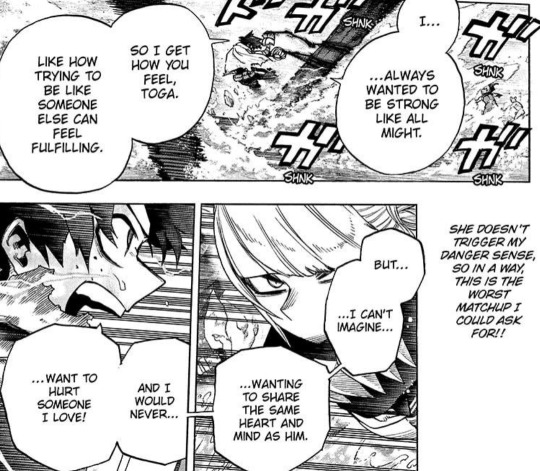
So for example when Deku tells Toga that he can't understand emulation as a feasible form of love, he's just unconsciously echoeing the abuse she went through — indirectly calling her a deviant for how she expresses her emotions, just like her parents and society. And when he tells her that he cannot accept how she hurts others for her own sake, without realizing that heroes do the exact same thing to villains, he's just reinforcing the idea that villains aren't people, not in the eyes of heroes. He's saying that only heroes can live freely without consequences for their own violence, just like how Hawks got away with murdering her friend Jin. But the same doesn't apply to her, or to people like her.

Deku condemning Toga's lifestyle but in the same beat seeing nothing wrong with hero society is what prompts her shutting off, and her decision to just fight the two people she previously loved, putting everything behind her. Seeking violence for violence's sake as a result of the umpteenth rejection from society.
I think that something similar is happening with Dabi.
All his life, Touya has been met times and times again with the reminder that he's a failure, that he's not good enough, and that his father will never acknowledge him as worthy of his time. Let's remember that what happened during the war arc was the culmination of a plan that spanned over eight years.
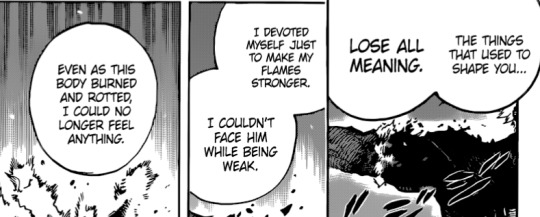
All this time, Touya has been plotting a way to finally get to meet with his father on equal grounds. Becoming a villain was instrumental to that, and so was pushing his body past its limits. Anything to reach a point where his strength would no longer be overlooked or ignored.
Yet, just like how Toga anticipated her meeting with Izuku as the moment she would get a better answer than the one she got from Ochako, and then had her hopes shattered with continued rejection, the same happened to Touya. He put all his money on this fight, believing that he'd finally done enough during the war for his father to consider him a legit threat. Much like when he was a kid, he didn't let himself be dissuaded by Endvr's continued avoidance, but instead fully convinced himself that Enji would show up the next time.
Yet, even after literally returning from the grave... Even after trashing his father's reputation on national tv, after burning his treasured heir alive in front of his eyes, even after the whole hero world is once again gathered here to wipe out the League, his father is still stubbornly elsewhere.
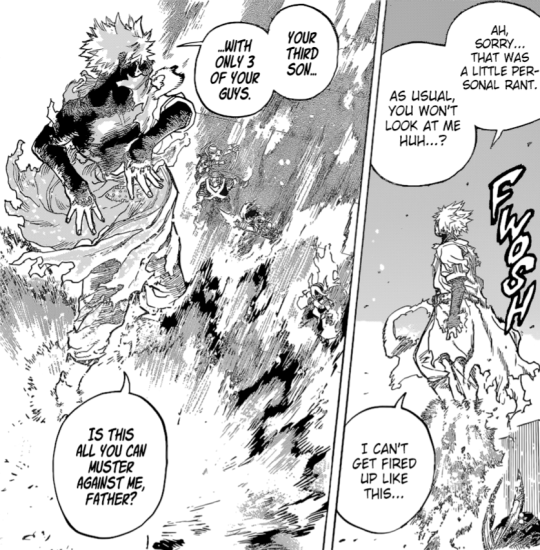
In this light, I don't read his going full out and destroying his body as particularly extreme; in fact, I'd say it's almost linear. Dabi has a pattern of self-harming with increased intensity the more he feels rejected from his father, and being ignored even after pulling off an overarching revenge plot that spanned eight years of his life... I think that would push anyone over the edge. Especially since the idea of "strength" is so ingrained into Dabi's worldview. He spent all this time pushing himself, training his quirk for their final confrontation despite the fact that his body is now even less capable of sustaining it, all because — again, I'm stressing this — he wanted to be as strong as his father and couldn't meet him while he was weak.
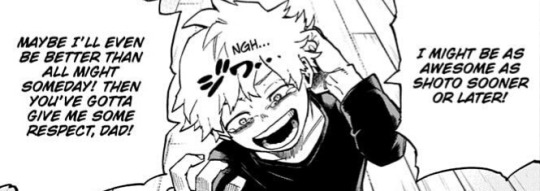
To Dabi, being as strong as or even stronger than Shouto was always the key to earning his father's respect back. And in fact, he trained himself to a point where his fire output is hotter than Shouto's,

So by all means, between his quirk prowess and the chaos he wrecked in hero society post war, this time he's not particularly wrong about how Enji should've given him his undivided attention. It's not that Dabi particularly expected Enji to become fatherly all of a sudden and care about facing his son. Dabi was counting on them meeting again as hero and villain. Remember that Enji is a hero obssesed with villain takedowns. He neglected his family for years because his job was more important than them, and Dabi meant to exploit this for his own gain. If he couldn't get his father to look at him by being a good fit for an heir, and if Enji used his job as an excuse to keep avoiding him, Dabi would become such a threat to the status quo that he would give his father no choice but to meet him on the other side of a battlefield. Then he would destroy his career and everything he loved. As a terrorist, he couldn't be overlooked anymore.
Or so he thought.
But the moment the portals close, one thing becomes very obvious. Enji isn't there. Not only that, but there's not even any high ranking heroes on the team assigned to take Dabi down. Just an high schooler (whose flames burn less hot than his), and a bunch of his father's sidekicks.
Now, of course we readers know that there was some amount of planning dedicated to the heroes' formation. Those who are facing Dabi are supposed to be the ones who can handle his flames the best and who aren't needed on AFO's side of the battle. But what Dabi sees is just that Enji didn't acknowledge his strength once again. Not only did he not bother showing up in person, but he also once again considered Dabi second-best to someone else, this time a (stronger) villain, AFO, who got all his undivided attention. Once again, all Dabi hears his father say is "failure, failure, failure. You are so weak, even my sidekicks can deal with you on their own. I don't need to be there."
And that's what prompts the "excessiveness" of those last pages. I think it's meant to read as an excalation, as a worsening for the heroes' odds to succeed.
In Toga's case, her character regression appears less self-destructive at face value because it doesn't involve graphic injuries, but both are shut-downs and thus indicate a negative development.
Now, I'm not particularly worried about Dabi not surviving this fight (or the manga), as I mentioned over and over in the past months. But the reason why I opened this reply stating I have mixed feelings about this is that I'm not thrilled with how things are going so far. I don't really subscribe to the time travel theory (yet?), so the breakneck pace at which any attempt at a conversation between the two sides is going to shit is not very promising. Despite this, I still think an understanding will be reached, because Horikoshi set it up, and Horikoshi doesn't do unexpected plot twists that you don't see coming from a mile away. So there's no way he's put as much narrative focus on the themes of connecting and empathizing only to then go back on all that work to kill them for shock value. But the fact that the heroes so far are doing everything wrong does make me question just how does Horikoshi plan to fix this
I'm willing to give him a chance on it, though. So far, the best writing in bnha always has always been tied to the League one way or another; judging from the great lenghts of sympathy and the spectrum of human emotion he shows us through the villains, I don't think he's about to throw them to the wolves. Not after he so clearly got attached to them too. I will believe that he knows what he's doing and this is happening for a reason
#Ali replies#Meta:dabi#Meta:toga#Bnha spoilers#Bnha 350#Bnha 349#My post#Maybe I'm a fool but I'd rather be hopeful than miserable at things that have yet to happen
88 notes
·
View notes
Note
Hi there! A lot of Toga fans wish redemption and some are very sure she might be redeemed by the end of the series. Which I find strange since Toga does have deep rooted issues. I can't imagine redemption for her just yet. What is your stance on Toga as a character and what do you think might happen to her in the future?
Hey! I have already discussed at length about this topic so I hope you don't mind it if I redirect you to a bunch of meta of mine.
But before I do that, I want to state a thing: what I envision for the League is not redemption, per se, but salvation. Which I think is also what those people were discussing, too. Toga, much like Shigaraki and Dabi, is being set up to be saved by her hero foil, Uraraka. I understand that not a lot of people have picked up on this because Horikoshi hasn't given it as much narrative focus as Deku's choice to save Shigaraki or Shouto's resolve to reach out to Dabi. But the basis for it is undoubtedly there. It started in the war arc in the chapter where Toga went off to meet Uraraka and asked her "if heroes save people but one of them killed my friend, does this means that we are not people to you?". A question that will no doubt reappear as a narrative challenge for Uraraka later down the road. I believe there already has been a callback to that encounter with Toga in a recent manga chapter as well. If it's going slower than Deku and Shouto's arcs is because Horikoshi is notoriously bad at giving girls as much narrative spotlight as the boys.
Anyway, to answer your question. Toga's issues aren't actually any more "deep rooted" than Shigaraki's or Dabi's. In fact, they are the very same issues. Almost down to a T. Because they all foil each other. (here I talked a bit about the foiling between Dabi and Toga)
Toga gets a lot of flack (both from the fans but also inside the story itself) for being a violent freak who can't control her crazy urges. But this reading of her doesn't match who she actually is, and it mirrors the dehumanization she went through as a child. Yes, Toga was introduced as someone with unaddressed issues. She seemed not to know how to relate to people without crossing boundaries, wanted to be close to others but came across as stalkerish and weird and ended up pushing them further away. And all of that fed into her dehumanization. The harder she tried to connect, the more she'd be rejected. This mimicks Touya's own trauma: the harder he tried to prove his worth to his dad, the more he was shunned and neglected.
The thing about her, though, is that Toga isn't actually a deviant. She is capable of connecting with people in a healthy way, without crossing boundaries and showing the ability to empathize that she wasn't able to deliver on in her first encounter with Ochako and Tsuyu. Toga proved as much with Jin, the first person she developed an healthy bond with.
On this topic, I strongly advise you read this excellent meta by linkspooky to better understand her. To quote from it,
Himiko did not become the way she is because she was lacking empathy or born with uncontrollable urges for bloodlust, but because of the environment around her that always forced her to repress herself. From the knowledge that her parents would never love her for who she really was. Himiko wasn’t born that way she was a response of what was done to her.
People who don’t really know Himiko always judge her this way, that she’s incapable of understanding other people, that she has no empathy for others. She’s almost literally labelled and dismissed as a one dimmensional yandere trope by the people surrounding her.
However, Himiko is in fact always doing the opposite. She’s constantly trying to empathize with others. Her maddened way of talking to both Tsuyu and Uraraka in her character introduction is exactly that, her trying to feel that kind of connection.
Himiko’s fascination for Uraraka is a desire for empathy and understanding.
Toga acts like a violent freak when she's treated like one, but compassionate, empathetic and kind when treated with compassion, understanding and kindness in turn.
In other words, Toga, too fits a wider theme in bnha: she's not an evil that was born, but an evil that was bred. Deku's journey tells us that there is a substantial difference between people who are "too far gone" and people who are pushed to do bad things because of their circumstances and because they didn't get help from a hero when they most needed it. That's the whole point of the current manga arc, and Deku's narrative challenge. Thematically, the League falls in the second category. As victims of hero society who turned monstrous after being dehumanized over and over, the Lov is not meant to be the one making amends. Everyone in the Lov, inlcuding Toga, became a villain to react to some sort of social injustice. That means that it's the system that needs to make up for a wrong here, not the victims it created.
Before I cut this answer short, I'm gonna link you up to one last post: here I discussed why I don't think that a punitive justice ending will be enough to wrap up the the thematic knots that the League brings forward. There I explain my reasoning for why Toga is also being set up to be saved
#ali replies#bnha#bnha meta#my post#meta:toga#one day I'll actually write a cohesive meta on her like I did for fuyumi#today is not that day#I spent way too long trying to articulate my thoughts here#and I still didn't explain them as well as I wanted to#ugh
56 notes
·
View notes
Note
What do you think about the relationship between dabi and toga?
To be honest I don't really have any deep thoughts on them, since they don't strike me as having a close bond.
Their most popular fanon representation portrays their relationship as siblings-like, but imho the same isn't true of canon. The reasoning behind that fanon portrayal seems to be the fact that they bicker a lot but still care about each other, but by that same metric, then Dabi should have a siblings-like relationship with the League as a whole. The way he treats Toga isn't any different from how he's constantly bickering / ready to throw hands with everyone else. Toga does care a lot about him in turn, but once again, it doesn't strike me as her singling him out specifically: Toga considers every member of the League as family. Personally, if I were to describe any League members as siblings-like, I'd say Toga and Tomura. Or Toga and Jin. The latter because he's been shown to be protective of her, and Tomura because Toga very much acts like he's a big brother to look up to despite the occasional knife to the throat, lol.
Going back to Dabi and Toga... The way I see their dynamic in canon is that they have many things in common, and they were inspired by the same person (though for different reasons), but Dabi affects distance from her the same way he acts distant to everyone else. He calls her crazy just like how he calls Spinner a lizard. He wants to make it a point that they're different. That he's not there to make friends, to quote Earlyroki. But they have more in common than they have things that set them apart tbh.
The Lov trio all foil each other as the "problem children" who were singled out and scapegoated as the element of unrest inside the household. If they ever opened up to each other about their pasts, they would probably find a lot of points of contact. But Toga doesn't talk about her past because she rejects the idea that her present life isn't normal, and Dabi kept his own backstory a secret because he rejects the idea of needing help.
As a kid, Toga was told to stop using her quirk, was forced by her parents to repress it to try and fit in with the other kids her age despite how she clearly felt like a fish out of water with them. Until the mask eventually broke and she snapped under all that pressure. Very similarly, Touya was told to stop using his quirk too, was strongly encouraged to try and find "normal" interests and find friends at school, but was ultimately unable to because he was the only kid who couldn't pursue heroics. And eventually his own mask cracked and he too snapped, burning alive.
Come to think of it, their seemingly opposite drives as their older selves are actually very similar too. Toga seeks connection and belonging to reclaim her idea of normalcy without having to repress who she is. As for Dabi, on the surface he seeks indipendence and self-reliance to reclaim his bodily autonomy, but deeper down, his actions also speak of the desperation of belonging, too. Much like when he was a kid, he's still begging his father to tell him why he exists. He's seeking a connection too, just not to the League but to his own family. Like Toga, he too craves the safety of knowing what's his place in the world, and just like her, he's reclaiming his right to be alive by using the one thing that marks him as a "defect" instead of suppressing it for his parents' comfort
Basically: they don't have much of a relationship as of now, but they should
53 notes
·
View notes
Note
I would like to ask your opinion about 3 views I have.
First is the idea of how Shigaraki, even when he was groomed to become a destruction machine, the moment AFO and Kurogiri (the ones he obeys no matter what) are out of the picture, he instantly thinks on protecting. Protecting the league, not as an organizationz but as the individual members he lates veiw as family. This leaves me thinking that any good in him is not only from Tenko (the pure but traumatized kid), but that Shigaraki Tomura (the vengueance-thirsted villain) also is by nature a relatively good person, just needing GUIDANCE (not fix nor correction) to project his ideals, which are even correct.
Second is how Toga said in the manga that she had a normal life, and I believe, in one way, she has. She has what she WISHES, was a normal life. She can be herself comfortably, people around her don't treat her as a freak or a monster (she even HAS FRIENDS), adults around her care and even parent her (as much as a group of walking disasters with no means to confront trauma can actually parent). Shouldn't that mean someting?
The last thing will be shorter, as, have you watched Naruto? Because a good amount of people liked to imagine Touya as Itachi (the older brother complex guy that sacrificed everything, accepting all the evils of the world, for a better good), when he actually was like Sasuke (the brother that wasn't as talented, so neglected until a tragedy, wanting revenge when wronged, mentable unstable as he discovers he is being used again and again, leading him to form a revolution so he doesn't have to suffer at hands of others anymore).
I would love to see your coments on these ideas as they aren't as developed as yours tend to be. Thank you for the attention, and sorry if you don't understand as english isn't my first language, besaides is too long.....
Your english is perfectly understandable! And your thoughts are interesting so I don’t mind answering.
I definitely agree with your take on Shigaraki! leadership-wise, he’s very different from the model AFO projected and tried to mould him as. I think that AFO’s plan was to raise Tenko in isolation and in constant exposure to his trauma triggers to instigate violence as a coping method, so that he would be more unstable and “broken” when he finally faced off against All Might. What he didn’t expect was for that isolation to serve the opposite effect: once Tenko grows up, once he has trusted comrades, the ties he forms with them are genuine. He does want the best for them, and protects them fiercely in that ruthlessly revengeful way of his. He’s a character who not only has known loss, but whose entire life has been shaped, moulded, distorted by it; so the few bonds he has, he hold on to.
The fact that he cares about his comrades as more than just pawns to use for his own purposes is also what makes him the opposite of AFO as a leader. AFO only seeked out blind devotion. He posed as a messiah, as a saviour. He gave powers away in order to gain followers who would be indebted to him, who would look up to him as an almost god-like being granting them mercy. Ujiko even went as far as comparing him to a buddha. The religious undertones are put there to emphasize that AFO positions himself as several steps above the masses that follow him. He doesn’t see them as individuals, only as a faceless army he can use and abuse at his will.
On the other end of the spectrum stays Shigaraki, who... well.


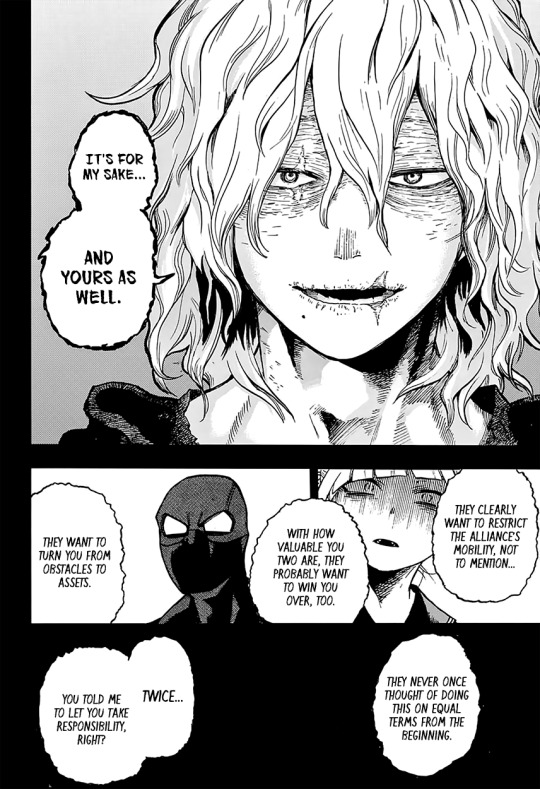
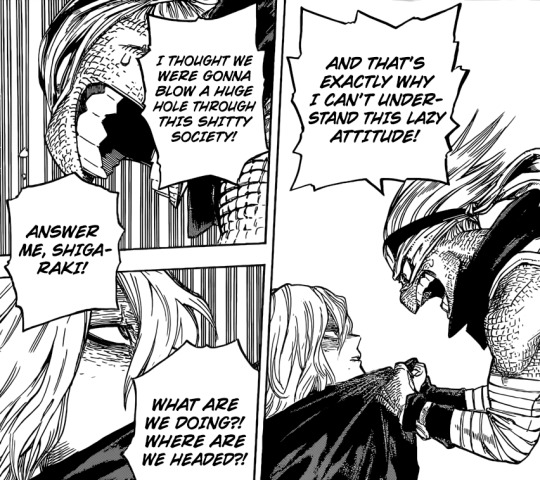
who is so up and personal with his comrades he lets them grab him, point a knife to his throat, yell at him... Lmao imagine someone grabbing AFO’s collar like that and shouting at him. You’d dream of doing something like that without getting murdered with someone like AFO. But with Shigaraki, it’s perfectly fine, because Shigaraki doesn’t think himself above them. Sure, he IS the leader and demands the respect he is owed for it, but at the same time, he’s a very community-focused type of leader.

He not only gives all his allies freedom to pursue their own goals (even when they directly clash with his), but he also makes time to listen to their needs, to talk at eye level with them. One thing I’d like to point out here is that when the chance presented itself to form an alliance with Redestro’s army, Shigaraki chose to do so specifically because he remembered Compress’ complaint about their homeless, penniless status following Kurogiri’s arrest.

so yeah, the League definitely has distinct found family elements ever since its direction fell onto Shigaraki alone, and yeah, he’s always been more than the tool for destruction that AFO tried to raise him as.
Moving on to Toga. I am 1000% convinced that the reason why she snapped and killed that Saito guy in middle school was because her family (and society) tried too harshly to convert her into something she wasn’t. They made her repress herself to the point where freedom to her ended up taking the shape of a violent rebellion, cause her life up to that point was the expectation to be a “good girl” who behaved herself and didn’t act like a “monster”. But when you take a closer look at her writing, you notice how backwards that narrative of monstrosity actually is. Ever since she joined the League, aka ever since she was free to be herself fully, free to drink as much blood without being shamed as a freak fot, ever since she was fully accepted without having to wear a mask... how many people has she killed by draining their blood? As in, completely on her own, not as a collective action with the rest of the lov? Zero. That’s right. Even Camie, who was kidnapped and held prisoner for three days as a blood bank during the provisional license exam ended up being fine. And she’s a hero in training, lol. Completely at Toga’s mercy.
The thing is, Toga showcases a remarkable ability to control herself and behave with the compassion and “normalcy” that her family demanded of her, when she’s actually treated with compassion and understanding back. She’s literally introduced through the lenses of an outcast and a freak, someone who aggressively tries to get included in things by acting creepy about friendships
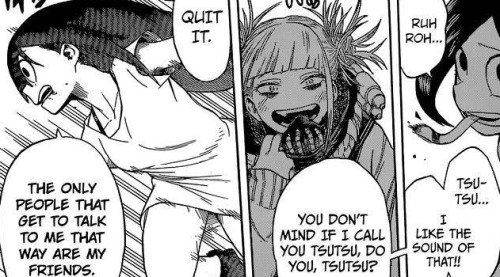

cause she supposedly cannot form true bonds with people — she’s too weird, too self-centered.
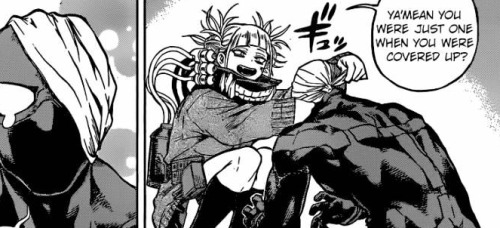
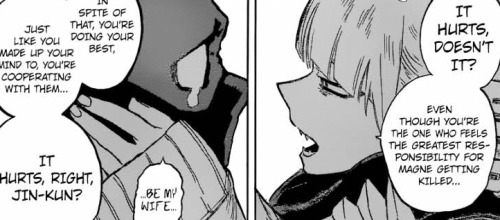
And yet, she forms the strongest friendship bond of the League all on her own. And it has nothing to do with her obsession with blood, with the fascination for violence that makes her “crush” on people.
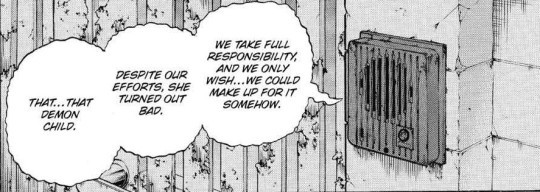
Her story shows that what makes people monsters is not nature but nurture. Her own parents called her a deviant, a monster, a demon child, they tried to make her feel shame towards a literal part of her own biology, tried to tell her to suppress it, put her through quirk counseling which is basically an in-universe version of conversion therapy, and then acted suprised when she had a breakdown and killed a kid because her biological need to drink blood became too much for her to suppress anymore. Quirks are just body functions. They could’ve let her explore her powers in a controlled way, but instead chose to treat her as a monster until she internalized that it was okay for her to be violent. She could be the monster everyone treated her as.
But it’s in the League that she learns true compassion and empathy, enough so to actually connect to someone — unlike her failed attempt with Tsuyu and Ochako at training camp. It’s when Twice treats her like a friend, that she learns what actual friendship is like, and is able to give Twice comfort in his moment of need, offering him her hankie so he wouldn’t fear ‘splitting’ anymore.
So yeah Toga is already living a normal life. All she needs is for society to finally give her the freedom and the understanding that the Lov already offered her, cause that’s the true key to make her “stable” and “normal”. Not violent suppression.
As for naruto, yes I’ve read it! And I agree with you, Dabi’s more like Sasuke than Itachi. Itachi believed in a superior state of things, unlike Dabi believed in institutions over individual morals until his very death, not to mention he was always a golden child, while Dabi was the scapegoat and the disillusioned kid.
#ali replies#bnha#bnha spoilers#bnha meta#my post#meta:shigaraki#meta:toga#league of found family#Anonymous
127 notes
·
View notes
Note
I've seen that you're also wanting a restorative justice ending for the league (as am I). Do you think that's likely to happen? I feel like society has been portrayed in shambles to prepare readers for an ending where there just isn't time to focus on stupid trials and prison (also prison system is down). I feel like as far as fiction goes, the LOV should be taken back in by society so they can help rebuild what's been destroyed. I feel like that should be enough, but many don't think so.
Yeah, I think that’s what the story is building up to.
There’s no way that a punitive ending is gonna work here, not after what we saw of the reality of prison life. This is how the guards talked about the prisoners:


Maggots would be treated better than this. They aren’t even recognized as human beings, just as a problem for the “good” citizens. As something unsightly that needs to be locked up for life so that no one else has to look at it. This is exactly the same behavior that Toga’s parents exhibited towards their daughter by the way, and the reason why she ended up running away from home and becoming a villain:

“despite our best efforts, she turned out bad”
“that demon child”
This is why locking her (and the rest of the League) away doesn’t really cut it. It’s not a solution. It’s just giving her more of the same abuse that she suffered through her whole life. Hero society has consistently been presented as flawed and full of holes. There’s a whole crescendo of things that address that corruption with increasing clarity, and it’s past a point where they can just... be ignored without any critical thinking spent on it. Those holes need to be fixed in order to give the story an ending, otherwise it’s just sweeping the entire premise of the story under the rug and calling it solved. Which is why the only narrative that would make sense and that would give a conclusive ending to what’s been set up till now is a narrative of rescue.
Thematically, if a prison ending had been enough to solve the problem, the prison system wouldn’t have been thrown into chaos and dismantled.
I’m using Toga as an example here, but what I’m arguing for can be applied to all the core lov members. She’s always been seen as a problem child, and forced to deny her sense of self and play the part of the good, obedient kid in order to make her family happy. She was asked to sympathize with everyone else’s definition of “normalcy” and to cater to their needs instead of her own, and scapegoated when she rebelled. So were Tenko and Touya. But no one ever tried to sympathize with her. To cater to her needs. They simply washed their hands of her until her only way to be accepted fully was to join a band of criminals. She even tells us that she started dressing up as a middle schooler because the whole world was less violent towards her when she appeared younger. So clearly an ending of her journey where she’s subdued with even more violence is not gonna be an effective way of rescuing her.
Can it even be called “rescue” if she’s given no choice but to surrender? That’s what Hawks attempted with Twice. Predictably, it didn’t work, now did it?
The thing is, none of the Lov members can truly be “saved” so long as they don’t accept that helping hand. And for them to accept it, they need to have a reason to want to abandon their path of destruction. They need to believe that society will truly have a place for them once they’re back, because as things are presently, there isn’t one. Shigaraki for example wasn’t just overlooked by the heroes. He was also rejected by his own family, who never stood up for him in order not to oppose his abuser. Dabi can’t go back to his family, if they keep talking about the things Dabi did as a result of their lack of care as something that needs cleaning after, like he’s still as much of an inconvenience and a problem child as he was when he was 12.
For them to stop in their plan to raid hero society to the ground, they need to be convinced that hero society can redeem itself. It can be made to look at villains like them as people, not just as “monsters who mingle with society because quirks have warped the standards for humanity.”
That’s also what Dabi was trying to accomplish with the broadcast, by the way. He wanted hero society to abandon “thoughtlessness”. That is, the uncritical idolization of heroes of the majority of the citizens that allows corrupted heroes to keep their jobs despite their own misdeeds.
And that’s the narrative challenge that the story is presenting to the new generation of heroes. Hero society as they knew it has been thrown into chaos. Things can’t go back to the way they were before, because so much changed in such a short time. Heroes resigned. So many were killed, both heroes and civilians. If the way things are currently handled had been enough, or even an effective way to stop villainy, then the current lawlessness wouldn’t exist. If hero society was a fool-proof system that didn’t need any revising, villains like Shigaraki would’ve never existed, let alone destroyed as much as they did. So heroism itself has got to change.
Imho, the story is currently at a turning point. This is where the hero kids will be asked to prove themselves, and to put in the real work to make society a truly fair place. I’m not saying that it’s right for a bunch of 15 year olds to shoulder the weight of fixing up the fuckups of their predecessors, but this is a shounen manga and they’re the protagonists, so this is their role in the story, and dealing with the League in a way that is more effective and permanent than just punching them and then locking them up is Deku and co.’s narrative challenge.
On the topic of “fixing”. Hero society as we know it hasn’t always been the norm. Before the HPSC took over and created quirk regulation laws to control society with, heroes didn’t even exist. They’re a fairly recent development. Before that, there used to be vigilantes. Coincidentally, now that heroism is facing a crisis and that the HPSC is in shambles, vigilantes rose once again, and they’re attempting to “fix” society themselves. Of course, they’re doing more harm than good, because when you make laws that forbid unlicensed civilians from exploring their quirks, they never learn how to use them properly. But I don’t think that Hori set up a second era of vigilantism just for shit and giggles, or just to add to the current chaos and social unrest. The fact that vigilantism surfaces as people’s primary solution when the law fails to be effective is a glaring hint that heroism only rose as a way to regulate and control what society was already doing en masse. They couldn’t stop people from using their quirks in public, either to help others or to commit crimes, so they just... put in place a system of regulations and laws limiting what kind of quirk use was tolerated, and what kind was “villainous”.
Nothing wrong with that in theory... except that with time, heroism as an ideal became corrupted, heroes focused more and more on appearances and on rankings than they did on actually helping people, and when the flaws of such a system started showing, they were swept under the rug, and the villains who addressed them sent to jail without a critical examination of why villainy never stopped despite how many heroes were given licenses every year.
I think that this second age of vigilantism is supposed to address that. To make it very apparent that the current status quo isn’t effective in dealing with changed times. What the existence of the PLF points out, thematically, is that there’s a huge chunk of Japan’s population (we’re talking about 17k people and those were just the ones that got arrested) that is dissatisfied with the current status quo, with quirk laws and the present social hierarchy. With this I’m not saying that the Liberation army has a point and should be allowed to have their way with their fucked up quirk elitist bullshit. But the fact that so many people bought into an anti-establishment ideology (one that posed such a big threat that the HPSC literally had to stage a military assassination to kill the revolt in the womb) proves that the system as it currently is, isn’t fit to regulate society as effectively as it might’ve done in the past. The fact that so many Liberation cultists were heroes themselves shows that heroism needs to change, if terrorists managed to slip into their ranks without anyone noticing. Quirk laws need to change to adapt and correct the social inequality that leads to the birth of well... for lack of a better word, fascist groups from becoming prominent.
In other words, just because the existence of the hero system makes it look from the outside like everything’s fine and dandy and people are safe and protected, that doesn’t mean that’s the truth. Which, ironically enough, is something that Shigaraki has been telling Deku from the start:


People are able to smile and to be carefree even as a villain is literally holding a child hostage in front of their eyes because the existence of heroes lulled them into a false sense of safety. As Dabi would say, they’ve become “thoughtless”, they stopped thinking critically because they believe in a superior state of things that will protect them no matter what. And that blind faith is exactly what needs dismantling, because it was what caused all the core league to fall through the cracks, slipping unnoticed and forgotten about.
If the kids want to build a society that’s actually fair, a society where people like Shigaraki won’t fall prey to villainy, they need to correct the way they think about heroes and about villains alike. They need to redefine what “saving” means, and they need to finally open their eyes and realize that what HPSC has done till now was just putting a band-aid on a gaping wound.
Until that change happens, the league cannot be saved, and thus there can be no solving of the thematic knot of the story.
#ali replies#bnha#bnha meta#bnha spoilers#meta:bnha society#meta:toga#meta:shigaraki#meta:league#my post#also. I couldn't find a place to fit this into that essay but#I don't think the league should be tasked with rebuilding what's been destroyed#thematically that's the heroes' job#their lack of care is what ended up in that destruction#so now they gotta square up and own up to it#what the league needs to do is just help in taking down afo#Anonymous
78 notes
·
View notes
Note
I'm glad that you are able to return to doing things you enjoy! I can completely understand how draining it can be not doing them for awhile. I look forward to the zines and wip you're workin on! I was curious if you'd be willin to do a meta on the dynamics that the lov have w/ each other. I'm still tryin to play catch up with the manga, but they have my soul atm. I'm workin on a few wip as well as an LoV au, n' I wanted to know your input. (if u can, THANK U, if not, 100% understandable)
Hey there! Thank you for being so nice :’) I’m glad you’re enjoying the content I put on this blog.
Anyway, to answer your question. Simply put, the League has very deliberate found family dynamics. I think that’s the reason why so many fans warmed up to them once they actually got an arc of their own. Cause they’re not just cruel bad guys, they’re complex and layered individuals fighting for things that we can actually empathize with, and whose struggles that make them grow closer to each other are always portrayed on screen with lots of depth.
Basically, the Lov is set up as a group of outcasts - all the people that don’t fit in hero society or who for one reason or another fell through the cracks. Putting aside guys like Muscular, Moonfish and Mustard, who were all some degree of unsympathetic (and in fact were removed from the core League early on), everyone is pretty much a victim of their circumstances. Not only that, but they also are often part of some kind of marginalized group.
(from here on, I talk about manga events so please keep that in mind if you don’t wanna get spoilers)
Starting from Shigaraki, he was the son of a strictly controlling patriarch first and later became the brainwashed heir to a crime empire. He was gaslighted into believing he exists to destroy and kept away from human touch for all his formative years.
There’s Toga who was called monstrous by her own family, who couldn’t understand her fascination for blood and her wish to explore a part of her identity, her quirk.
There’s Dabi, whose disability brings new focus to the theme of quirk incompatibility with one's body. His backstory has yet to be confirmed, but he also so very clearly holds a grudge against heroes as rescuers, because he wasn’t saved.
There’s Twice who dropped out from school at 16 to work to sustain himself when he lost his family, and who was pushed into villainy by a series of misfortunes ranging from poverty, loneliness, and lack of empathy from the law enforcers who saddled him with an unfair criminal record.
There’s Spinner who was a hikikomori (a shut-in) because the prejudice and hate he suffered as a heteromorph (and as a weak one to boot) made him lose all aspirations in life and fall in a depressive slump.
There’s Magne, a trans woman who experienced discrimination, who became a villain to fight for a world that would accept her for who she was.
There’s Kurogiri who should’ve never ended up the way he did, if only people had paid more attention to youths and how to better pace their development to wait until they were ready to take on dangerous situations.
And there’s Compress… Admittedly we don’t know much about him, but allegedly lost status or wealth, since he pretty much still acts like it.
The reason behind this wordy introduction is simple. The League is where all these mismatched people found a place to belong, a group of individuals who were equally broken or equally determined to lash out against the establishment that ruined their life and then didn't help them when they most needed it. One thing I find interesting about them is that despite the fact that they did have a goal at the beginning of the story, it has changed and evolved with time, the longer they spent with each other and got challenged by their losses.
Compare all the above with how they evolved:
Shigaraki did become Afo’s heir, but also rejected his will; he chose to be his own master, and to use his new power for his own goals. He also rejected the kind of leadership Afo wanted him to embrace. Shigaraki doesn't lead the Lov like Afo did with his crime network; he's not a puppeteer behind the scenes. He’s always fighting on the frontlines along with the rest of his comrades, and often he’s bearing the brunt of the attack to shield them. Think of how during the highway scene after Chisaki’s arrest, Shigaraki chose to be the distraction, charging the police car (and the only hero there) head on to give the others room to stop the convoy.
At the beginning of the story, Shigaraki was very much a detached sort of leader. He bossed people around and threw fits when things didn’t go according to his plans. He still charged head on, but Afo’s influence on him was clear, because he didn’t think of his comrades as valuable people, only assets to defeat a boss.
That has changed drastically after Magne’s death. That loss made him face the reality that he was still lacking as a leader, and he grew immensely from it. Not only he devised a plan to destroy Chisaki’s empire by exploiting their “alliance”, but he also chose to do so specifically for his comrade’s sakes.
A far cry from the brat who let dozens of low-rank villains get arrested at USJ cause they’d already served the purpose of acting as decoy.
Shigaraki’s character growth is the best one depicted in the manga imho. A lot of his character is defined by his interactions with his peers. He’s like a sponge because he’s constantly absorbing things - both from his allies and from his enemies - and making them his new strengths.
What I find interesting about him is that Afo's gaslighting hasn't undone who he is deep down. Tenko was an aspiring hero and someone who made sure to include all the kids when he played, leaving no one out. Those traits of his show through to this day. A lot of the time, I feel like fans glide through the fact that Shigaraki isn't at all a bossy leader anymore. In fact, he keeps his comrade's wishes and complaints in mind at all times.
I think this misconception came from the fact that when he's challenged by an enemy he dislikes, he always retaliates tenfold until he completely destroys them by taking what matters most to them (he did this with Chisaki by stealing the quirk erasing drug, his life's work, and his hands, the only thing that made him a leader. He also did this with Redestro, dusting the tower that symbolized his power and dominance from above, and stealing his empire & network for himself).
But… with his comrades, he's not like that. We've seen him face insubordination twice so far, and he always took it stride without even getting mad.
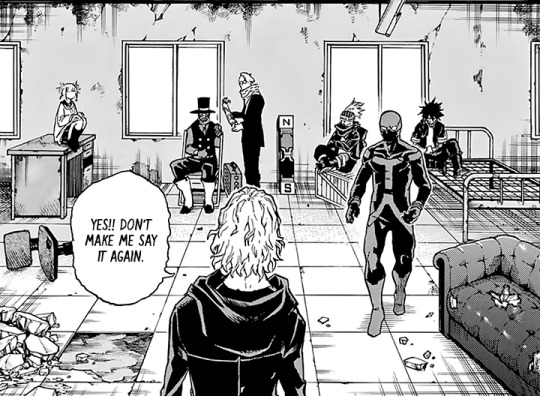
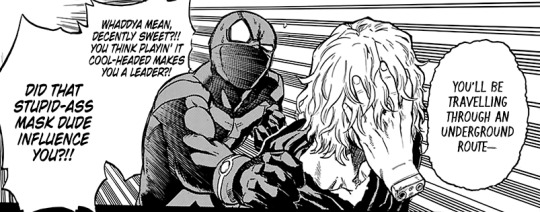
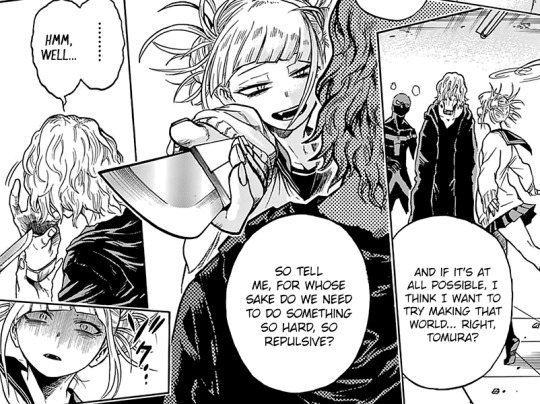
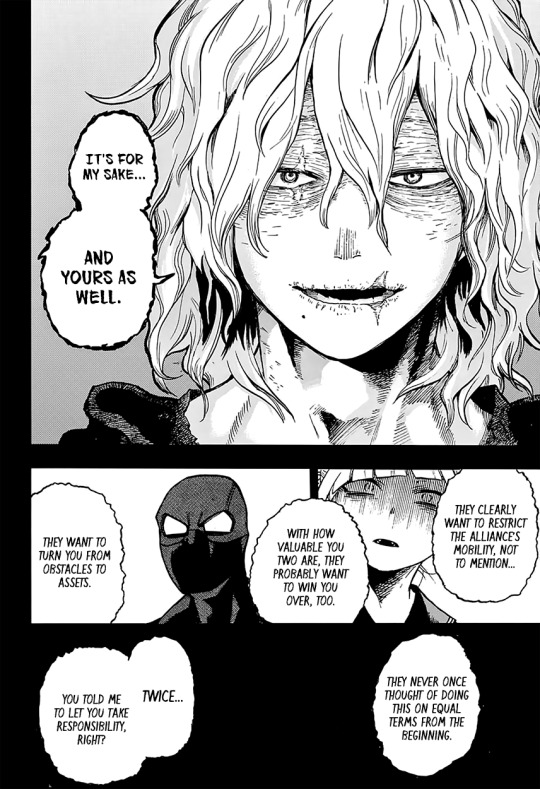
When Twice and Toga threatened him after hearing that he planned on continuing the alliance with Chisaki even after Magne's death, Shigaraki replied evenly, with confidence, showing that he had thought of their feelings and this wasn't a rash, detached kind of decision. He had a plan, and he didn't intend on letting Magne's death mean nothing to him. For a character so greatly impacted by loss from a very young age (whose given name literally means "mourning"), you can probably gather why for yourself.
Another insubordination he faces calmly is Spinner's.
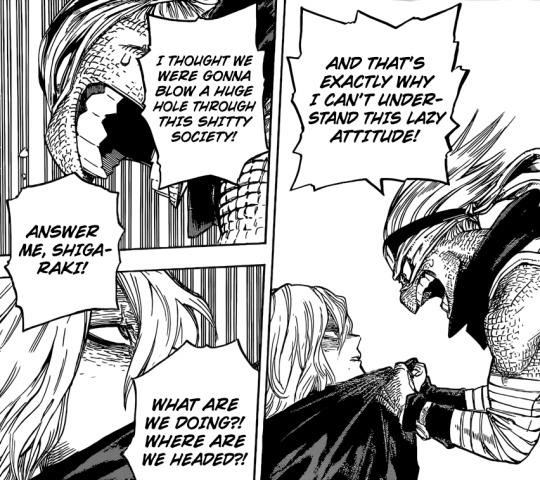
He lets him grab his collar and scream at him and he barely blinks. He doesn't make excuses, either. At this point, the Lov was broke and homeless, on the run with nowhere to crash, they'd just lost Kurogiri and any sense of purpose. It's not like Shigaraki acts brilliant and pretends like this was all part of the plan. Or that he urges Spinner to stay with them despite his doubts that they're after a goal anymore. Cause to Shigaraki, the rest of the League is a bunch of people with free wills. He does give them orders as any leader should, but at the end of the day, he's also always allowed them to have goals of their own.
On this topic, here's a post on why he's also cool with Dabi & Toga having separate agendas that don't align with his desire for systemic destruction. You could also argue that this chill and lax attitude towards leadership is also a subconscious way of rejecting Afo’s upbringing. Afo was controlling even when he set things out to make Shigaraki feel like he was taking his own decisions. Shigaraki is pretty much the opposite.
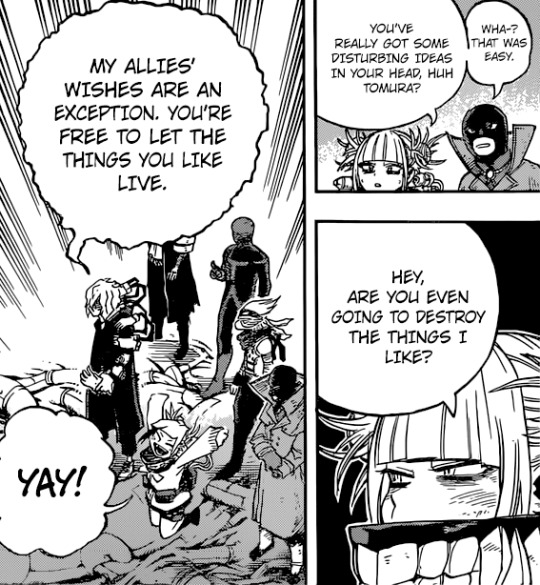
He even changed his own purpose a little (“destroying everything”) to account for Toga’s personal goal (“destroying everything except the things my comrades want to keep”). That’s because Shigaraki is aware that the League is a bunch of people that doesn’t really fit in anywhere else in hero society.
This found family aspect is also shown in a lot of other things. For example, it’s Toga finding true friends who accept her for who she is in the other League members. We are told early on that quirks are just another body function. Yet, hero society found Toga’s to be monstrous and demanded she repress it and forced her to wear a mask of normalcy that ended up only amplifying her desire for violent rebellion.
The thing about treating a kid like a monster all the time, is that at some point that kid is gonna believe you and start acting like one. What is labeled as “Insanity” in her case is just the reflection of the dehumanization that the adults in her life subjected her to.
As pointed out here, Toga is not an unsympathetic, bloodthirsty demon. She’s a layered individual, and she’s the protagonist of the the most empathetic scene of the story. It’s not a coincidence that she only ever shows that more human side when she’s with other lov members, while she is perceived as freaky and crazy by people on the hero side. Because hero society only ever treated her with violence, while the lov gave her a safe space to explore her identity without judgement. As a result, she treats the rest of the lov with kindness and acceptance too. This prompts her character development.
Toga’s character revolves around the theme of connection. As stated above, she never really fit in. She had no friends, and her own family shunned her. What happened then was that she internalized that to have connections, she needs to suppress her identity and take up a new one. She killed her classmate, Saito, in middle school because he was popular, smiling and friendly and she wanted to be like him. People, and children in particular, tend to copy the behaviours they perceive as successful, because emulation is part of a child’s normal process of learning the world. Hers is... an extreme case of emulation that ends up becoming literal because of the way her quirk works.
Without going too deep about it, basically suppression of the self is freedom to her because she can fit in better than when she tries to be “normal” as herself. This is shown in particular when she manifests jealousy towards Ochako as the subject of Deku’s trust. She too wants to be trusted unconditionally like Ochako is. Her character basically boils down to her desire to be close to the person she loves, the person she has a strong connection to.
The lov was the first group of individuals who never tried to mold her into something she wasn’t, and you can see how this impacts the way she forms connections with people. With Twice, she was able to form a meaningful relationship with another person that didn’t revolve around her obsession for blood, and that was full of empathy and companionship.
Now, I could go on and explain how the League is thematically the place that gives belonging and legitimacy to all the lov’s members reasons to resent hero society. I could because there’s so much more to say, particularly in regards to Twice & how Hawks fits in that, but it’s too hot to keep typing this on my pc without any a/c, sorry XD brain melty
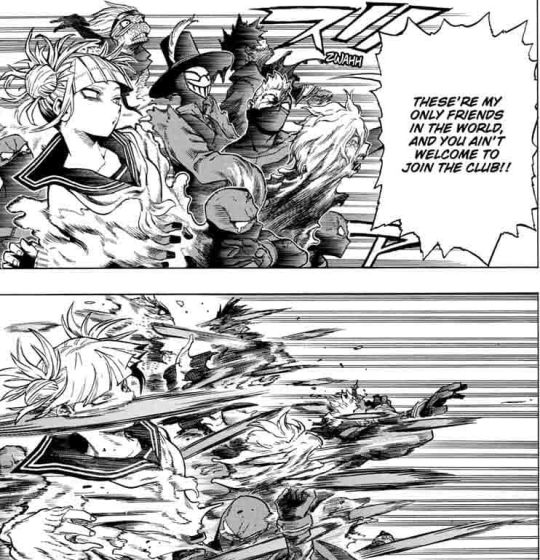
The short version is that the lov is deliberately written as a group of outsiders - each in their own light - and each one of them explores a different ramification of the failures of hero society. The bonds that they form with each other then are not just born out of necessity, but often become a rebellion in and of itself. When Hawks then tried to pry them apart by offering Twice the chance of reformation in jail, he also unconsciously repeated the abuse they suffered at the hands of hero society: splitting them apart into “good” and “bad” victims, people who could still be saved and hopeless cases, when the truth is that none of them should’ve become a villain in the first place, if only heroes had been more competent and noticed the cracks of the system sooner.
330 notes
·
View notes
Note
Since toga has snapped because twice was killed, who do you think will be able to calm her down? If she is more unhinged than usual, she may be even more of loose cannon and cause trouble for her team. She usually does what shigaraki says so maybe he can calm her down? Or mr. compress?
Mmh. I guess I'm not really thinking of it in those terms. Cause Toga isn't actually "crazy". She's lashing out because she's grieving the loss of the first real bond with another human being.
I think it's important to remember here that Toga hasn't had any stable relationships in all the 17 years she's lived, let alone any healthy ones. Jin was the person that came closest to that, because they gave each other understanding and trust.
She isn't used to letting out her emotions in any healthy way, and that's why her interest for other people, her wish to be trusted, manifests as bloodlust and stalking. Linkspooky wrote several posts on how Toga is always at her most violent when she's treated like a freak, because she subconsciously mimicks the violence directed at her. This is merely another occurrence of that.
Consider the parallel with Dabi: Dabi also similarly "snapped" and became violent and unsympathetic to Hawks when Hawks dehumanized the League and subdued Twice through violence, later further dehumanizing Dabi by remarking Dabi's supposed lack of empathy for a friend's death (manifested by his lack of tears). Toga also gets dehumanized in a similar manner. Her ahegao gets called freaky, disturbing, even if to Himiko is the only way she knows how to physically manifest her joy. Her imitation of the - chan Ochako and Tsuyu use to refer to each other at training camp is a clumsy attempt at gaining the trust of people her age. She wants to fit in and belong. Yet it becomes another thing used against her as proof of her insanity.
But Toga isn't actually a bloodthirsty monster, and neither does she lack empathy, just like Dabi. That is the hero narrative that was forced on them to justify a raid like this one, when murder suddenly became excusable when the heroes commit it, but that classifies people as monsters when it's the villains who do it.
Toga is someone who just lost a close friend. This is not a "point of no return" or anything like that. It's a lashing out that directly parallels Dabi's and Shigaraki's, because all three of them are currently being victimized by the actions of heroes who are acting unheroic. The heroes think of them as monsters, and they dehumanize them to the point where we actually witness the villains donning the clothes of said monsters in explicit rebellion. They're getting in charge of that dehumanizing narrative, because it's one that directly harms them, and turning it against the people who invented it to harm them instead.
But. I think it's important to understand that this doesn't tell us anything about who they inherently are as people. This is an act that they're putting on. A systematic rebellion against an oppressive system that is blind to its own flaws.
At their very core, the League of villains isn't made of monsters.
Shigaraki used to be a shy child who played heroes with the bullied kids, and who had dreams of becoming a hero like his grandma. He was so gentle and sweet he didn't even fight back against the physical abuse he endured, and had to be forcibly gaslighted by afo into embracing violence.
Spinner is someone pushed into villainy by racial prejudice, and someone who is willing to dedicate his entire life to making someone else's dream come true.
Compress is someone who jumped into the frey right after Magne's murder because he thought he could neutralize the threat Chisaki posed, and thus protect the rest of the League from getting burtally slaughtered too.
Dabi is someone who was deeply hurt by heroes, but who still tried to break through a hero trainee's brainwashing to make him think for himself and make him a better hero.
Twice was someone who understood true loneliness better than anyone, and thus made the League a home not only to fellow League members, but also reached out to comfort and give understanding to Hawks too, weeks after meeting him, because he was able to sense his lack of human contact.
Toga is someone who has incredible amounts of perceptiveness and empathy, and she used those skills to comfort Jin while he was having a mental breakdown, wrapping a hankie on his head to ground him, having an immediate understanding of how best to help him born of all the time they got to spend in a normal, non-toxic relationship.
The league is made up of murderers who committed (and are still committing) crimes, true. But that doesn't automatically revoke their humanity, or makes them monsters with no possibility of "going back". That's just what heroes (like Gran Torino) tell themselves to justify the fact that they choose to abandon victims of abuse that fell through the cracks of their system, victims of abuse that the hero system didn't acknowledge before they were left to fend off for themselves in a world that dehumanizes them until they embrace that violence as a flawed method of self defense. Let's not forget here that Toga started wearing middle school uniforms despite being 17 because she noticed that people were less violent to her when she appeared younger.
In a universe where legalized violence to suppress political dissent is the norm, what the League represents is the threat posed by those who don't fit in that system. They've always been the outcasts, the outliars. But one point that can never be stressed enough is that they are made to be the outcasts. They are made to be the monsters. But they're not.
So I guess what I'm trying to say here, in a really convulted way, is... That this is less something that Toga needs to "snap out of", and more like a point that Horikoshi is trying to drive home by making all the lov parallel each other, each getting victimized by the heroes in their own light. Dabi by being told that Hawks' actions were the right choice, thus proving the narrative that Dabi's own death at the hands of a hero was excusable. Toga by losing her first genuine bond with another person that didn't involve Trasformation and thus a need to imitate and further repress herself. Shigaraki by getting targeted by a bunch of heroes treating him like a sentient weapon instead of a human being, thus basically repeating the same dehumanizing abuse Afo, a literal villainous mastermind, subjected him to.
So I see the current conflict less as Toga losing her mind and needing to be reminded of her priorities and more as the Lov as a whole cementing themselves as those who will challenge the status quo, forcing the hero system to bend to their wishes, instead of passively suffering its whims for once. I see this as them finally gaining a collective goal that coincides.
I hope that answers your question!
#Ali replies#Bnha#Bnha meta#Meta:toga#Meta:lov#Meta:bnha society#My post#Toga himiko#Abuse tw#Bnha spoilers#League of villains#Shigaraki tomura#Dabi#Bnhw 273
405 notes
·
View notes